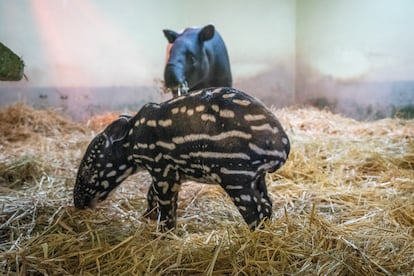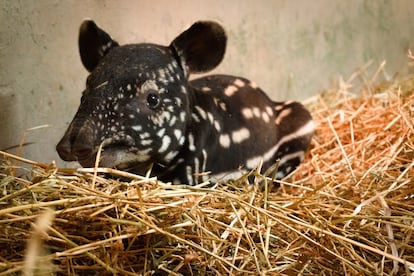Spain’s first Malayan tapir is born in captivity
Bioparc Fuengirola has achieved this milestone after two decades in the breeding program for the endangered species, of which there are barely 2,500 individuals left in the wild globally
It weighs around 10 kilos (22 lb), its sex is still unknown, and it doesn’t even have a name. But there’s a small animal with dark hair and white spots that has kept a large team of specialists on edge ever since its mother became pregnant in early 2024. Their nervousness was understandable. This is the first Malayan tapir (Tapirus indicus), an endangered species, ever to be born in Spain. And it is one of only 24 worldwide to have done so in the last decade in captivity.
“We’ve been trying for many years, and it’s finally been possible. We’re thrilled; it’s incredible,” enthuses Javier Vicent, head of the Zoology team at Bioparc Fuengirola, where the miracle was captured and recorded by the zoo’s cameras. Everyone there now spends 24 hours a day monitoring the calf to ensure it’s developing well.
“They are very unique mammals,” says Vicent, noting that adults typically weigh around 300 kilos (600 lb). They are solitary, herbivorous, and live in the jungles of Malaysia and on the island of Sumatra in Indonesia. They are related to horses and rhinoceroses. As prey for large predators like the tiger, they have a highly developed sense of hearing and smell, although they suffer from myopia.
Their mottled fur evolves gradually, and when they are six months old, they change to a very distinctive adult coloration: one part white and the other black, which helps them camouflage themselves among the light and dark of the jungle. This is a basic element for their survival.
Even more so given that there are barely 2,500 individuals left in the wild (plus about 50 in captivity), who are having increasing difficulty reproducing due to the fragmentation of their habitat because of deforestation for crops. That’s why the birth of this baby tapir is such a joy to behold.
The birth gives meaning to a conservation program that the center, located on the Costa del Sol, has been pursuing for more than two decades. Rawa — the mother’s name — and Mekong — the father — are the latest specimens to pass through these facilities under the European Association of Zoos and Aquariums (EAZA) Endangered Species Program. It hasn’t been easy, especially because for captive breeding to happen, there must be compatibility between the adults, and that’s not easy at all. Some didn’t tolerate each other well. And those who did were not interested in sex.
Rawa, who arrived in Málaga at 11 months old in 2019 from France, also struggled with another male named Pi. That was until Mekong showed up in 2023, at the age of eight, from Sweden. Then everything fell into place. The pair got along well, and at the end of that year they began to mate. They were last seen mating in early 2024, but the impregnation is believed to have occurred weeks later, as the calf was finally born on March 29th after 13 months, a typical gestation period for the species.

A quick birth
For weeks, some movements had been noticed in the female’s abdomen — like the little kicks that pregnant women feel — and the entire team was reassured because the weekly ultrasounds indicated that everything was progressing as planned. Then, on Friday afternoon, the mother began to feel more nervous than usual, and by nightfall, things got worse.
At 3:20 a.m., she delivered her baby in less than two minutes. The calf cleared the membranes, ate the placenta, and shortly afterward was nursing. The images captured by the surveillance cameras “show the strength and tenderness of this natural process, highlighting the beauty of one of the most unknown and endangered species on the planet,” according to the animal park, one of 20 worldwide and the only one in Spain working on the conservation of the Malayan tapir within EAZA.
“There is information in international manuals, but it’s a poorly described species, so we’re being very cautious and monitoring everything during the quarantine,” says the veterinarian Adrián Martínez.
Rawa, who is a first-time mother, is responding well to the baby’s care and feeding. The calf is also doing well: eating, following the mother, walking well, and responding to stimulation. It’s showing energy, and that’s important. When it’s a week old, Martínez will check it to determine its sex and weight, and conduct an extensive examination.
“I’m excited about this birth,” says the vet, who believes the baby is a female. “But it’s not yet confirmed,” he warns. If everything keeps going smoothly, the young tapir will soon be allowed outdoors.

The team of specialists at the Málaga facility has 24-hour access — even from home — to the cameras that monitor the progress of the mother and her baby. They will spend the next six to nine months together if their relationship is good.
From then on, the baby will be transferred to another center to continue supporting the future of the species. And if it is confirmed that she is a female, a male will be found for her who is not genetically related to either one of her parents so that she, too, can become a mother someday.
Sign up for our weekly newsletter to get more English-language news coverage from EL PAÍS USA Edition
Tu suscripción se está usando en otro dispositivo
¿Quieres añadir otro usuario a tu suscripción?
Si continúas leyendo en este dispositivo, no se podrá leer en el otro.
FlechaTu suscripción se está usando en otro dispositivo y solo puedes acceder a EL PAÍS desde un dispositivo a la vez.
Si quieres compartir tu cuenta, cambia tu suscripción a la modalidad Premium, así podrás añadir otro usuario. Cada uno accederá con su propia cuenta de email, lo que os permitirá personalizar vuestra experiencia en EL PAÍS.
¿Tienes una suscripción de empresa? Accede aquí para contratar más cuentas.
En el caso de no saber quién está usando tu cuenta, te recomendamos cambiar tu contraseña aquí.
Si decides continuar compartiendo tu cuenta, este mensaje se mostrará en tu dispositivo y en el de la otra persona que está usando tu cuenta de forma indefinida, afectando a tu experiencia de lectura. Puedes consultar aquí los términos y condiciones de la suscripción digital.
More information
Archived In
Últimas noticias
From digital curfews to blocking apps: How technology experts protect their children online
Why the price of coffee has skyrocketed: from Brazilian plantations to specialty coffee houses
Confined to a Cuban hospital: When electricity is a matter of life or death
The complicated life of Francesca Albanese: A rising figure in Italy but barred from every bank by Trump’s sanctions
Most viewed
- Why we lost the habit of sleeping in two segments and how that changed our sense of time
- Pablo Escobar’s hippos: A serious environmental problem, 40 years on
- Trump’s obsession with putting his name on everything is unprecedented in the United States
- The Florida Keys tourist paradise is besieged by immigration agents: ‘We’ve never seen anything like this’
- Charles Dubouloz, mountaineering star, retires at 36 with a farewell tour inspired by Walter Bonatti











































